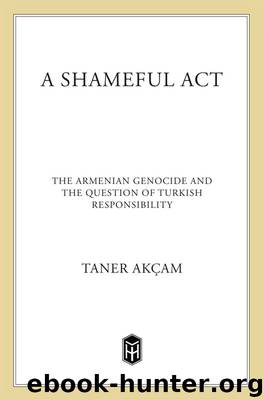A Shameful Act: The Armenian Genocide and the Question of Turkish Responsibility by Akcam Taner

Author:Akcam, Taner [Akcam, Taner]
Language: eng
Format: epub, mobi
Publisher: Henry Holt and Co.
Published: 2007-08-21T00:00:00+00:00
CHAPTER 8
THE TURKISH NATIONAL MOVEMENT’S POSITION ON THE GENOCIDE
It is difficult to speak of a single, consistent approach taken by the Turkish National Movement in regard to the Armenian genocide. The main reason is that the National Movement approached the issue as a secondary aspect of what it called the National Pact—that is the creation of a Turkish state within the boundaries established by the armistice agreement in 1918. One factor which influenced the National Movement’s attitude was the overwhelmingly Unionist character of the movement. Another was a continuing conflict over eastern Anatolia with the new Armenian state established in the Caucasus within the former Russian boundaries in May 1918 as a consequence of the Bolshevik revolution. The new Armenian republic sought to expand its territory to include parts of eastern Anatolia.
* * *
The Turkish National Movement was frequently accused of being Unionist in character by both the Allied Powers and the political opposition. In fact, given the exigencies of foreign policy, the nationalists disavowed any connection with the Unionists on many occasions. They did not wish to be associated with the wartime atrocities and the Armenian genocide. But no matter how much they protested, it was clear that a large majority of the movement’s leaders—including Mustafa Kemal himself—were either former members or closely associated with the CUP. Halil Paşa, Enver’s uncle, claimed that “there were Unionists leading the movement in Erzurum and organizing people in the Aydın and Aegean regions. But we had to hide that the movement … was a Unionist movement.”1 Among the nationalists themselves, however, there was, of course, no reason to hide this fact. Mustafa Kemal did not hesitate to state that he had been a Unionist. Celal Bayar, the Unionist secretary in the Aegean and later president of the Republic, recounted that Kemal once said: “You know, I too am a Unionist.”2 And despite all the criticism directed at the CUP, of which he was a member, and especially at its leadership, Mustafa Kemal never left the party.
Doubtless, there were differences of opinion between Mustafa Kemal’s emerging faction and the entrenched Unionist leaders, Talât and Enver, differences that gradually made themselves felt openly. Indeed, the National Movement saw itself as in some ways “settling accounts” with the CUP. Foremost among these differences was Mustafa Kemal’s rejection of the idea of multinational empire, that is, Pan-Turanism and Pan-Islamism. He strove instead for a Turkish state whose borders would only encompass those areas in which the Turks were a majority.3 Early in his military career, he had been an open advocate of Turkish nationalism. He supported detaching the various Arab provinces from the empire. In his view, “The Constitutional Regime must not be built upon the corpse of the Ottoman Empire, which has lost its coherence and is now outmoded; on the contrary, it must be based upon the part of the empire in which the Turkish majority lives.… A Turkish state must be established.”4
As a strong nationalist, Mustafa Kemal opposed the efforts of the Talâts
Download
A Shameful Act: The Armenian Genocide and the Question of Turkish Responsibility by Akcam Taner.mobi
This site does not store any files on its server. We only index and link to content provided by other sites. Please contact the content providers to delete copyright contents if any and email us, we'll remove relevant links or contents immediately.
| African-American Studies | Asian American Studies |
| Disabled | Ethnic Studies |
| Hispanic American Studies | LGBT |
| Minority Studies | Native American Studies |
Cecilia; Or, Memoirs of an Heiress — Volume 1 by Fanny Burney(32558)
The Great Music City by Andrea Baker(32019)
Cecilia; Or, Memoirs of an Heiress — Volume 2 by Fanny Burney(31956)
Cecilia; Or, Memoirs of an Heiress — Volume 3 by Fanny Burney(31942)
We're Going to Need More Wine by Gabrielle Union(19046)
All the Missing Girls by Megan Miranda(16029)
Pimp by Iceberg Slim(14508)
For the Love of Europe by Rick Steves(14121)
Bombshells: Glamour Girls of a Lifetime by Sullivan Steve(14076)
Talking to Strangers by Malcolm Gladwell(13370)
Norse Mythology by Gaiman Neil(13366)
Fifty Shades Freed by E L James(13243)
Mindhunter: Inside the FBI's Elite Serial Crime Unit by John E. Douglas & Mark Olshaker(9344)
Crazy Rich Asians by Kevin Kwan(9292)
The Lost Art of Listening by Michael P. Nichols(7506)
Enlightenment Now: The Case for Reason, Science, Humanism, and Progress by Steven Pinker(7314)
The Four Agreements by Don Miguel Ruiz(6765)
Bad Blood by John Carreyrou(6622)
Weapons of Math Destruction by Cathy O'Neil(6281)
